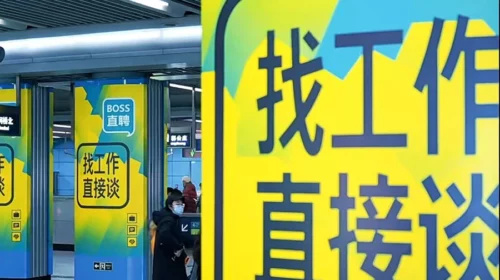CHINA BULLETIN: It’s the Economy, Stupid, Part 2

Welcome to the latest Bamboo Works China Bulletin, where we recap the top China macro, industry and company developments from the past week and give you our spin on what it all means. In this week’s issue it’s all about the economy in 2023, and “Avatar” swims to the top of China’s box office. On a scale of 1 to 10, we give the week a 5 for offshore-listed China stocks.
Doug Young, Editor in Chief
MACRO
It’s the Economy, Stupid, Part 2
Ok, maybe we’re dating ourselves a little by referencing a famous line used by Bill Clinton during the 1992 U.S. presidential campaign. But that same line is increasingly shaping us as the big theme for China in the year ahead, as central leaders look to rebuild an economy decimated by draconian Covid controls that have only just ended.
In comments published last week, top leaders pledged to deepen reform, restore market confidence and boost economic stability at the key annual Central Economic Work Conference meeting. Separately, the central bank and State Council said they will prioritize growth and boosting the property sector next year. Get set for some big government spending in 2023!
Crashing Confidence
Anyone who doesn’t understand Beijing’s sudden big interest in the economy has probably been living in a cave for the past year. The latest in a steady series of alarm bells since the middle of this year came from a monthly survey last week that found China’s business confidence in November fell to its lowest level since 2013.
The ink was barely dry on that survey when the World Bank issued its latest economic forecast for China, cutting its expectation to 4.3% growth next year from an earlier forecast for 4.5%. Both figures are already quite low for China, which has posted 5% growth or more for most of the last two decades.
Investors Take Pre-Holiday Break
Investors remained largely on the sidelines during the last full week before the Christmas holiday. The Hang Seng China Enterprises Index rose by a scant 0.1% last week, while the iShares MSCI China ETF lost 1.2%, compared with a 0.7% rise for the broader Hang Seng Index.
The flat-lining follows a late-year rally for U.S.- and Hong Kong-listed China stocks on a number of positive signs from both the U.S. and China. But at the end of the day, these companies will need to start returning to growth – preferably strong growth – if this rally is to be sustained. That’s largely out of the government’s hands, and by no means guaranteed.

INDUSTRY
It’s All About Property, Stupid
If it’s all about the economy in 2023, then China’s ailing property market – and the government’s efforts to support it – should stay in the spotlight as well. Reports of new government moves to support this critical component of China’s economy seem to come out daily, and last week saw the head of top developer Vanke say the level of support has exceeded even his own expectations.
Another major development saw two smaller real estate developers, CIFI Holdings and Agile Group, announce plans to raise funds by selling new shares. Beijing previously prohibited such share sales, cutting off a major fundraising channel for this group of debt-addled companies. It reversed course earlier this month, though it’s far from clear that anyone will want to buy those shares.
Chinese Underwriters Take Global IPO Crown
China’s economy may be in the dumps, but you would never know from looking at its IPO record for 2022. China passed the west this year to become the biggest underwriter of new offerings, with Citic Securities overtaking Goldman Sachs as the top underwriter, followed by CICC, according to data compiled by Bloomberg.
While IPOs slowed to a crawl in most of the world, they kept surging in China, with Shanghai and Shenzhen as the top two fundraising grounds in 2022. Much of the discrepancy owed to very different monetary environments in China versus the rest of the world. While most of the world engaged in aggressive tightening, China was relaxing credit to try and boost its sputtering economy.
Avatar Swims to Top of Chinese Box Office
We haven’t been to see it yet, but the James Cameron blockbuster “Avatar: The Way of Water” seems to be doing quite well in China. The film booked 451 million yuan in ticket sales in its first five days of release in China, accounting for 61% of the total for the entire month of December, according to one industry data source.
The film is just about everywhere in Chinese theaters these days, or at least the ones that are still open. Chinese were quite gaga for the original “Avatar” movie, so many will return for a second helping. What’s more, good films have been scarce so far this year, partly due to a near-lockout of foreign movies, meaning there’s probably huge pent up demand among movie buffs.

COMPANY
Xiaomi Joins the Job-Slashing March
Move over, Facebook and Amazon. Smartphone maker Xiaomi is showing it’s just as capable of big job cuts as the global tech giants, announcing it will cut about 10% of its workforce in a year-end fat-trimming exercise.
In fact, the Chinese tech giants have been at the job-cutting game for most of this year, starting well before Facebook and Amazon made their own announcements of massive layoffs. That’s because the China techs have been under the gun for nearly two years now, the result of regulatory clampdowns by Beijing designed to curb monopolistic practices and other undesirable behavior.
Taiwan Joins the China Chip-Stifling Train
First it landed at the center of a storm a few weeks ago after unrest erupted at its massive central China compound making iPhones. Now Foxconn is once again coming under fire, this time from its home government in Taiwan, which has fined the company and ordered it to sell its illegal stake in a mainland Chinese chipmaker.
While the U.S. wants to stifle China’s chip-making ambitions to keep it from making some of the tech industry’s most sophisticated products, Taiwan’s reasons for taking similar steps are far more practical. Chipmaking is one of Taiwan’s top industries, and thus it hardly wants to nurture and compete with a new field of mainland rivals.
U.S. Hangs Up on China Telecom
China Telecom, one of the country’s three main carriers, has lost its appeal to keep offering service in the U.S. That occurred after a U.S. federal appeals court last week rejected the company’s bid to overturn a U.S. government order that took effect early last year.
Chinese telcos haven’t fared too well in the U.S. lately. In addition to being barred from offering services, their shares were also booted off Wall Street this year after they were added to a blacklist barring U.S. investors from buying the stocks. Both the service and listing bans are largely symbolic since none of the Chinese telcos ever did much business in the U.S.
AND FROM THE PAGES OF BAMBOO WORKS
| 17 Education Soars on U.S. Investor Return to China Stocks Last week we shined our spotlight on a series of sudden and very dramatic price gains for several U.S.-listed Chinese stocks, including education services providers 17 Education and Gaotu Techedu, as well as dating app operator Hello Group and news app operator Qutoutiao. All of their shares jumped 50% or more in just a matter of days, with much of the gains often happening over one or two days on a huge surge in trading volume. The collective phenomenon appears to reflect smaller institutional investors rushing back into the beaten-down group on recent signs they may be set for a strong rally in 2023. |
| ‘Blue’ to the Core Recruiter Eyes Hong Kong IPO Last week we also spotlighted a very “made in China” investment play in the form of a company called Youlife International, which filed for a Hong Kong IPO earlier this month. The company has carved out quite a cozy niche by offering employment services for blue collar workers, which are in short supply in China these days. While most employment specialists go for white collar workers, which typically offers better rewards, Youlife’s play at the lower end of the job spectrum looks quite shrewd. That’s because China has rolled out a raft of measures to support this end of the job market lately, including incentives for operators of vocational schools, to help fill strong demand for such workers. |






